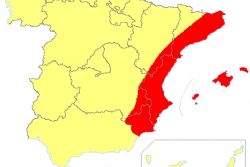- Business
- Childbirth & Education
- Legal Formalities
- Motoring
- Other
- Pensions & Benefits
- Property & Accommodation
- Taxes
- Airports and Airlines Spain
- Paramount Theme Park Murcia Spain
- Corvera International Airport Murcia Spain
- Join us for Tea on the Terrace
- When Expat Eyes Are Smiling
- Meet Wincham at The Homes, Gardens & Lifestyle Show, Calpe
- QROPS 2014
- Spain Increases IHT in Valencia & Murcia
- Removals to Spain v Exports from Spain
- The Charm of Seville
- Gibraltar Relations
- Retiro Park : Madrid
- Community Insurance in Spain
- Calendar Girls
- Considerations when Insuring your Boat in Spain
- QROPS – HMRC Introduces changes that create havoc in the market place
- QROPS – All Change From April 2012
- Liva & Laia : 15th November

Murcia became the 3rd region to request an emergency loan today, whilst Valencia signaled it needs funds to cover current and past overspending, adding further financial pressure on PM Mariano Rajoy.
Just 24 hours after Catalonia said it needed €5 billion from an €18 billion bailout fund announced by Rajoy last month, a Murcia official yesterday put its needs at €700 million euros. In Valencia, an unnamed official confirmed that €3.5 billion euros would cover only current needs.
The country's regions risk overwhelming a plan to tackle the euro area's 3rd biggest budget deficit. They were responsible last year for most of Spain's overspending, which remained nearly unchanged from 2010 at 8.9% of GDP.
Together with Murcia, Valencia and Catalonia, Spain's 2 most indebted regions, aim to use more than half of Rajoy's last bailout fund, created to enable regions to face bond redemptions and finance their deficits in the second half.
Bailout Fund
"Everything depends on Andalusia now," said Juan Rubio- Ramirez, an economist at Duke University in Durham, North Carolina. "If Andalusia asks for aid, it could be a similar amount to Catalonia and that means the fund may not be enough." Rubio-Ramirez co-authored a report this month forecasting the regions may run deficits as high as 4% of GDP this year, compared with 3.3% last year and a target of 1.5% for 2012.
Andalusia, one of the 4 largest contributors to Spain's GDP along with Madrid, Catalonia and Valencia, doesn't rule out making a request, a local official who declined to be identified said by telephone. Along with Castilla-La Mancha, Andalusia, Valencia and Catalonia in June tapped 68% of the €17.7 billion of loans set up by the government for the regions to settle their backlog of unpaid bills.
ECB Involvement
The 4 also used over 60% of another mechanism that prevented regional defaults in the first half, an approximately €5 billion credit line from the Spanish government's bank Instituto de Credito Oficial, or ICO. The region with the highest deficit last year, Castilla-La Mancha, hasn't yet decided whether to tap the new fund.
Rajoy has said he'll decide whether to request more aid after the ECB details its involvement in a bond-buying plan aimed at lowering governments' borrowing costs. Van Rompuy this week said European authorities are ready to assist.
Economy Minister Luis de Guindos yesterday said a European mechanism to lower spreads would be thrashed out at a meeting between EU finance chiefs in Cyprus Sept. 14-15. The yield on Spain's 10-year benchmark bond yesterday fell 2 basis points to 6.46%, narrowing the gap with similar German maturities to 5.08 percentage points.
The government has budgeted for Catalonia's needs, de Guindos told reporters in Madrid. "The government appreciates Catalonia's efforts and has no doubt that it will continue to do what is necessary to meet this year's and next year's deficit targets."
Junk Rating
Catalonia may not be able to pay bills until it receives aid, news agency Efe reported, citing spokesman Francesc Holms. With their debt rated junk by at least one rating company, Valencia and Catalonia started losing access to capital markets in 2010, prompting them to rely on selling securities known as patriot bonds to their residents.
The regions have a combined debt load of €145 billion, which has doubled since 2008 to the equivalent of 14% of GDP. Redemptions will amount to about €15 billion in the second half of this year, according to data from the Budget Ministry.










